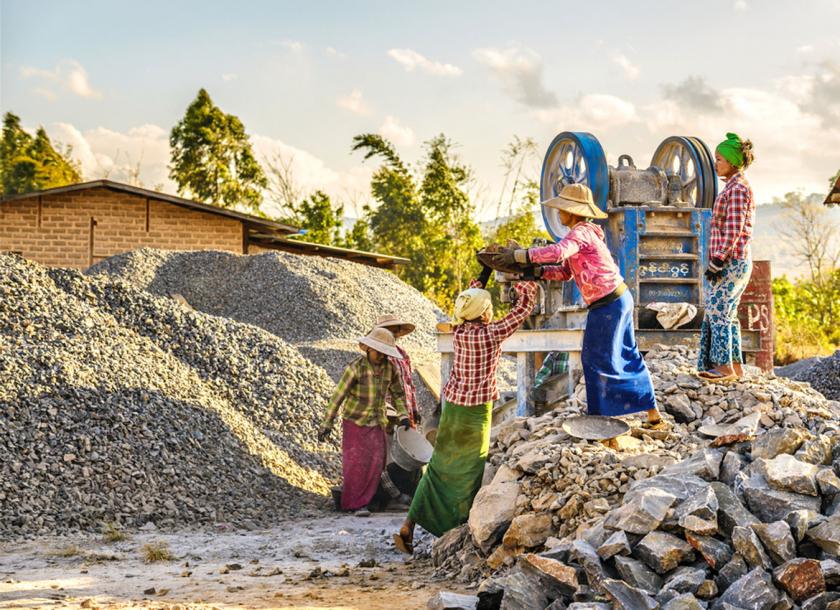The legal framework regulating the mining sector needs to be reconsidered if Myanmar wants to attract responsible mining investment and address past problems
13 มีนาคม 2561
"A fresh start, a clear policy vision, and simple laws to underpin it, are essential if mining is ever to contribute to sustainable development in Myanmar."
The legal framework regulating the mining sector lacks consistency and clarity while the capacity of government and companies to monitor mining activities is limited, representatives from the Myanmar Centre for Responsible Business (MCRB) said, arguing that a fundamental rethink is necessary if Myanmar wants to attract responsible mining investment and address past problems.
Yangon-based MCRB yesterday held a press conference for the launch of sector-wide impact assessment (SWIA) on the mining sector. The report includes field research focussed on tin, gold and limestone mining in eight states and regions in the country, and is the fourth SWIA by the MCRB.
There are few environmental, social and human rights protections in the mining sector, according to the study. Widespread poor practices prevail. Even at larger established mines, very few good practice examples could be identified. Extensive adverse impacts on the environment and human rights were documented across the country and different types of mining.
This implies that if Myanmar’s mining sector is to be developed to make a positive contribution to the country’s development, significant steps will need to be taken by the government, businesses and civil society, to address current problems and work towards the implementation of good practices.
‘The entire approach to mining in Myanmar needs a rethink.’
Vicky Bowman
Myanmar Centre for Responsible Business
Five main challenges for achieving responsible mining in Myanmar were identified. Firstly, policies, laws and regulations relevant to mining activities lack clarity and inhibit responsible investment. Secondly, the capacity of government and business actors to monitor and address environmental, social and human rights impacts of mining is limited. Thirdly, the environmental, social and human rights costs of mining are externalised on local communities. Fourthly, governance of mining in conflict-affected areas is highly problematic. Fifthly, extensive informality in the mining sector needs to be addressed.
In terms of the laws, inconsistencies were found between the Union-level requirements outlined in the 2012 Environmental Conservation Law and permissions issued at state/region-level regarding permissible distance of mining activities from water sources. There is also lack of consistency between the Mining Rules and the EIA Procedure.
“The development of mining sector regulation in Myanmar has taken place over the last two decades, but is still based on a 1994 Mining Law which is now outdated. The legal framework is also fragmented between mining and gemstones.
The 2015 Amendments to the Mining Law only made minor changes; and the 2018 Rules, since they are based on that amended Law, can also only tinker at the edges,” Vicky Bowman, MCRB director, said.
‘Overall, the SWIA research found few environmental, social and human rights protections in the mining sector and widespread poor practices.’
SWIA of Limestone, Gold and Tin Mining in Myanmar
Myanmar Centre for Responsible Business
“The entire approach to mining in Myanmar needs a rethink. Our field team observed so many negative impacts when undertaking the research for this assessment. Most of the harms were felt by workers – including women and children - and born by the environment. A rethink is also needed if Myanmar is to develop the modern Mineral Rights Cadaster it needs to meet EITI standards. A fresh start, a clear policy vision, and simple laws to underpin it, are essential if mining is ever to contribute to sustainable development in Myanmar,” she added.
Ms Bowman said she recommended that the government embark on a transparent and consultative process to develop the National Mineral Resources Policy which Nay Pyi Taw is currently considering.
“Ideally the policy should be cross-governmental, and should cover all minerals including gemstones. It should be designed to support peace and effective natural resource federalism. There is plenty of international expertise and experience to draw on. The policy can then serve as a basis for a complete overhaul of all the laws relating to mining to set the sector on a sustainable path,” she explained.
U Aung Kyaw Soe, extractives programme manager of MCRB, added at the press conference that Nay Pyi Taw’s enforcement ability is weak especially in self-administered areas under the control of ethnic armed groups such as Bago, Kachin and Kayah. Some mining industries in those areas are under the supervision of the ethnic armed groups. The regulation and monitoring of the environmental and human rights issues in the sector are poor.
Claus Teilmann Petersen, the Director for Human Rights and Development at the Danish Institute for Human Rights, added that it is encouraging that the government is seeking to formalise artisanal and subsistence mining (ASM) rather than outlaw it. This is because, while ASM has significant negative impacts on human rights and the environment, it also benefits thousands of poor people.
“Formalising artisanal mining is a difficult task. It can’t simply be addressed by a new set of rules on licencing. But as there are other countries which have gone down that track, they can provide lessons learned to Myanmar,” he noted.
One lesson for putting together an effective Artisanal and Subsistence Mining (ASM) Management Strategy is that governments need to consult with all stakeholders, including the subsistence miners themselves. Their right to livelihood will be affected by an approach which doesn’t take the specific nature of ASM into account.
(The Myanmar Times: https://www.mmtimes.com/news/myanmars-approach-mining-needs-rethink.html )











